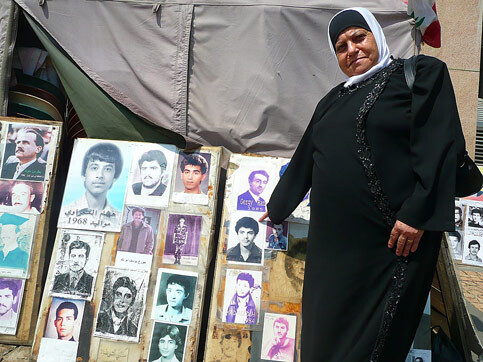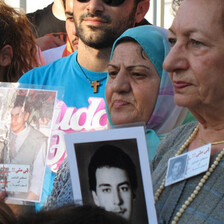Electronic Lebanon 17 December 2008

Zahira Najjar last saw her teenage son Abdallah in 1982. (Lucy Fielder/IRIN)
BEIRUT (IRIN) - It was the summer of 1982 when Zahira Najjar, 66, last saw her son Abdallah, then 17 years old. The family was in Bhamdoun, a mountain resort east of Beirut, at the height of Lebanon’s 15-year civil war. Only Syrian forces were on the ground when Abdullah went to find transport to the capital to get his wounded leg seen to, Najjar said.
She has seen and heard nothing of him since. “I can’t describe my feelings. A mother’s heart cries blood,” Najjar said, pulling a black-and-white photograph of the youth from her wallet. “But we live in hope. May God have mercy on the mothers and families of the missing.”
Abdallah is one of 643 “victims of enforced disappearance” on a list drawn up by the NGO Support of Lebanese in Detention and Exile (SOLIDE) and based on family testimonies.
Most were detained by Syrian forces during the 1975-1990 civil war, the group says, or handed over by allied Lebanese and Palestinian militias, to disappear into Syrian jails. A few were detained by the Lebanese or Syrian military during the 1990s, when Syrian forces dominated Lebanon.
Some disappeared after civil war
However, there are some who disappeared after the civil war. Sonia Eid has sought — since the early 1990s — to learn the fate of her son Jihad, a fighter with General Michel Aoun, who rose against the Syrians at the end of the civil war. She discovered at the time he had been taken to the “Palestine Branch” intelligence headquarters in Damascus.
In 2002 she was among a group of mothers who were permitted to go there. “We saw seven prisoners going past about 200 meters away with their eyes covered and one looked like him, but I can’t be sure,” she says. “They were like sheep, chained together, and he was pushed with a rifle butt.”
But Syrian promises to examine the file came to nothing and the trail went cold.
“It’s a nightmare we’re living, a disaster,” Eid said. “I have faith that Jihad is coming back. I have the feeling he’s still with us.”
Syrian forces pulled out in 2005 under intense pressure following the assassination of former Lebanese Prime Minister Rafiq Hariri, which many in Lebanon and the West blamed on Syria. Damascus denies involvement.
“We know for sure there are Lebanese still alive in Syrian prisons,” said Ghazi Aad, co-founder of SOLIDE, at the group’s weekly sit-in in downtown Beirut. “After 2005 things have changed. We have to close this file.”
SOLIDE has had a few successes — the release of 121 detainees from Syrian prisons in March 1998 and a further 54 in December 2000, but has made little progress over the past eight years.
Diplomatic ties
Syria and Lebanon established diplomatic ties in mid-October 2008 for the first time since the neighbors became independent from French rule in the 1940s. Ambassadors have not yet been exchanged.
Syrian Foreign Minister Walid al-Moallem angered many Lebanese by saying since the victims’ families had waited so long, they could “wait a few more weeks.” But he also said the issue was key to better relations, in what SOLIDE’s Aad called unprecedented official acknowledgment that the Lebanese missing were in Syria’s jails. “It’s a first step. But it should trigger a future investigation, not just talks,” he said.
Syrian officials have said they would launch their own investigation into the whereabouts of nearly 800 Syrians they say have disappeared in Lebanon, but nothing of the inquiry has been made public.
A committee formed in June 2005 meets regularly at the border to exchange information. It has the power to collect information from those who come forward, but not to seek witnesses and investigate, Aad said. SOLIDE is calling for representatives of the missing people’s families and concerned NGOs to join the committee, and for an expansion of its mandate. But Aad said justice ministry officials recently told him the Syrian side had rejected the proposal.
A Lebanese justice ministry source could neither confirm nor deny SOLIDE estimates of the number of missing, but said the committee was gathering information. Justice Minister Ibrahim Najjar said in August that Lebanon was asking Syria to reveal the fate of 745 citizens missing in Syria.
“Resolving it depends on the Syrians,” the source told IRIN. “At least now we know there are people alive in [Syrian] prisons.”
Cautious optimism
Legal expert and justice editor for the independent, pro-opposition Al-Akhbar daily, Omar Nashabe, expressed cautious optimism, saying November’s visit by Lebanese Interior Minister Ziad Baroud to Damascus had created a positive atmosphere.
“But it’s insufficient. There needs now to be judicial coordination — that would be the way forward,” Nashabe said, adding he hoped that would happen before the end of the year.
This item comes to you via IRIN, a UN humanitarian news and information service, but may not necessarily reflect the views of the United Nations or its agencies. All IRIN material may be reposted or reprinted free-of-charge; refer to the copyright page for conditions of use. IRIN is a project of the UN Office for the Coordination of Humanitarian Affairs.

